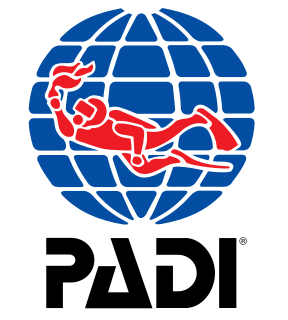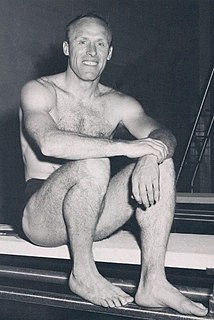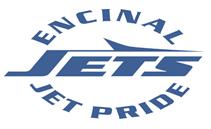Related Research Articles

The Professional Association of Diving Instructors (PADI) is a recreational diving membership and diver training organization founded in 1966 by John Cronin and Ralph Erickson. Cronin was originally a NAUI instructor who decided to form his own organization with Erickson, and to break diver training down into several modular courses instead of the single universal course then prevalent.
A divemaster (DM) is a role that includes organising and leading recreational dives, particularly in a professional capacity, and is a qualification used in many parts of the world in recreational scuba diving for a diver who has supervisory responsibility for a group of divers and as a dive guide. As well as being a generic term, 'Divemaster' is the title of the first professional rating of many training agencies, such as PADI, SSI, SDI, NASE, except NAUI, which rates a NAUI Divemaster under a NAUI Instructor but above a NAUI Assistant Instructor. The divemaster certification is generally equivalent to the requirements of ISO 24801-3 Dive Leader.
The National Association of Underwater Instructors is a non-profit 501 (c) (6) association of scuba instructors. It is a recreational dive certification and membership organization established to provide international diver standards and education programs. The agency was founded in 1960 by Albert Tillman and Neal Hess. NAUI is headquartered in Tampa, Florida, US) with dive and member instructors, resorts, stores, service and training centers, located in Japan, South Africa, the Middle East, Europe, Brazil and the Pacific Rim.

A lifeguard is a rescuer who supervises the safety and rescue of swimmers, surfers, and other water sports participants such as in a swimming pools, water parks, beach, spa, river and lake. Lifeguards are trained in swimming and CPR/AED first aid, certified in water rescue using a variety of aids and equipment depending on requirements of their particular venue. In some areas, lifeguards are part of the emergency services system to incidents and in some communities, lifeguards may function as the primary EMS provider.

Recreational diver training is the process of developing knowledge and understanding of the basic principles, and the skills and procedures for the use of scuba equipment so that the diver is able to dive for recreational purposes with acceptable risk using the type of equipment and in similar conditions to those experienced during training.

Hobie Billingsley is an American diving champion and honoree of the International Swimming Hall of Fame. He took the judges oath at the 1996 Summer Olympics in Atlanta.

Football Canada is the governing body for amateur Canadian football. It is Canada's representative member of the International Federation of American Football (IFAF), the world's governing body for American football, although it focuses primarily its own Canadian form of the game. Football Canada is headquartered in Ottawa, Ontario.
Ronald Brian Jacks was a Canadian Olympic and international swimmer in the 1960s and 1970s. He is currently a leading coach for Canadian swimmers such as Richard Weinberger through the Pacific Coast Swimming Club.

Encinal High School is a public coeducational high school serving grades 6-12. It is located in Alameda, California, United States, and is part of the Alameda Unified School District.

Swimming lessons are the process of learning to swim. In most countries there is a definition of a number of swimming levels that are reached in the process of the curriculum. The respective certificates of swimming tests are required for further training in aquatic abilities. Many countries have defined a minimum swimming level that children should reach by the end of primary education, in most cases with the help of school swimming classes being part of the normal curriculum.

The Royal Life Saving Society Canada operates throughout Canada as the Lifesaving Society. The Lifesaving Society is a national, volunteer and charitable organization and registered charity composed of 10 provincial/territorial Branches, tens of thousands of individual members, and over 4,000 affiliated swimming pools, waterfronts, schools and clubs. The Society works to prevent drowning and water-related injury through its training programs, Water Smart public education, drowning prevention research, safety management and lifesaving sport.
Swim England is the national governing body for swimming, diving, water polo, open water swimming, and synchronised swimming in England. It forms part of British Swimming, a federation of the national governing bodies of England, Scotland, and Wales. These three are collectively known as the Home Country National Governing Bodies.

The Bronze Cross is a certification in water rescue that is the mainstay of the lifesaving training offered in Canada, and awarded by the Royal Life Saving Society of Canada. Before one can take the Bronze Cross course, the Bronze Medallion (Canada) is required. With Bronze Cross and Standard First Aid certification, one can be an assistant lifeguard in some provinces. For National Lifeguard Certification or to become an Instructor, a current or expired Bronze Cross and current Standard First Aid certification are required. The Bronze Cross endurance swim requirement is 600 metres in 18 minutes using any combination of strokes.

The Bronze Medallion is the second step towards the lifeguarding certification in Canada. The award is part of the Lifesaving Society's Bronze series of awards. Bronze Medallion includes water safety, rescues, resuscitation, and an introduction to spinal injury management. It is the prerequisite for Bronze Cross; Standard First Aid with CPR-C and 16 years of age are the prerequisites for National Lifeguard Service. The Bronze Medallion endurance swim requirement is 500 meters (550 yd) in 15 minutes using any combination of strokes.

The average member of the United States Navy's Sea, Air, Land Teams (SEALs) spends over a year in a series of formal training environments before being awarded the Special Warfare Operator Naval Rating and the Navy Enlisted Classification (NEC) 5326 Combatant Swimmer (SEAL) or, in the case of commissioned naval officers, the designation 1130 Special Warfare Officer. All Navy SEALs must attend and graduate from their rating's 24-week "A" School known as Basic Underwater Demolition/SEAL (BUD/S) school, a basic parachutist course and then the 26-week SEAL Qualification Training program.

A professional fitness coach is a professional in the field of fitness and exercise, most often instruction, including professional sports club's fitness trainers and aerobics and yoga instructors and authors of fitness instruction books or manuals.

Diver training is the set of processes through which a person learns the necessary and desirable skills to safely dive underwater within the scope of the diver training standard relevant to the specific training programme. Most diver training follows procedures and schedules laid down in the associated training standard, in a formal training programme, and includes relevant foundational knowledge of the underlying theory, including some basic physics, physiology and environmental information, practical skills training in the selection and safe use of the associated equipment in the specified underwater environment, and assessment of the required skills and knowledge deemed necessary by the certification agency to allow the newly certified diver to dive within the specified range of conditions at an acceptable level of risk. Recognition of prior learning is allowed in some training standards.

Infant swimming is the phenomenon of human babies and toddlers reflexively moving themselves through water and changing their rate of respiration and heart rate in response to being submerged. The slowing of heart rate and breathing is called the bradycardic response. It is not true that babies are born with the ability to swim, though they have reflexes that make it look like they are. Babies are not old enough to hold their breath intentionally or strong enough to keep their head above water.

Introductory diving, also known as introductory scuba experience, trial diving and resort diving are dives where people without diver training or certification can experience scuba diving under the guidance of a recreational diving instructor. Introductory diving is an opportunity for interested people to find out by practical experience at a relatively low cost if they would be interested in greater involvement in scuba diving. For scuba instructors and diving schools is it an opportunity to acquire new customers. An introductory diving experience is much less time-consuming and costly than the completion of autonomous diver training, but has little lasting value, as it is an experience program only, for which no certification is issued. Introductory scuba diving experiences are intended to introduce people to recreational diving, and increase the potential client base of dive shops to include people who do not have the time or inclination to complete an entry level certification program.
The Universal Referral Program (URP) is a system intended to facilitate completion of training for open water recreational scuba diving students who intend to do their training dives at a place different from the venue for the theory and confined water training. More specifically, it allows inter agency referral - the referral instructor is not necessarily a member of the same certification agency as the initiating instructor.
References
- ↑ "Become an Instructor - Canadian Red Cross". Red Cross Canada. Retrieved 25 January 2016.
- ↑ "Water Safety Instructor - American Red Cross San Diego / Imperial Counties Chapter". American Red Cross. Retrieved 25 January 2016.
- ↑ "Swimming Canada Coaching - Swimming Teacher – Red Cross Water Safety". www.nccpswimming.ca. Retrieved 25 January 2016.
- ↑ "Swimming Teacher – Red Cross & I Can Swim – Swimming Canada". www.swimming.ca. Retrieved 25 January 2016.
- ↑ "NCCP Swimming – Swimming Canada". www.swimming.ca. Retrieved 25 January 2016.